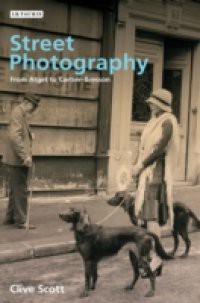Street photography is perhaps the best-loved and most widely known of all photographic genres, with names like Cartier-Bresson, Brassai and Doisneau familiar even to those with a fleeting knowledge of the medium. Yet what exactly is street photography? From what viewpoint does it present its subjects, and how does this viewpoint differ from that of documentary photography? Looking closely at the work of Atget, Kertesz, Bovis, Rene-Jacques, Brassai, Doisneau, Cartier- Bresson and more, this elegantly written book, extensively illustrated with both well-known and neglected works, unpicks Parisian street photography's affinity with Impressionist art as well as its complex relationship with parallel literary trends and authors from Baudelaire to Philippe Soupault. Clive Scott traces street photography's origins, asking what really what happened to photography when it first abandoned the studio, and brings to the fore fascinating questions about the way the street photographer captures or frames those subjects - traders, lovers, entertainers - so beloved of the genre. In doing so Scott reveals street photography to be a poetic, even 'picturesque' form, looking not to the individual but to the type; not to the 'reality' of the street but to its 'romance'.

